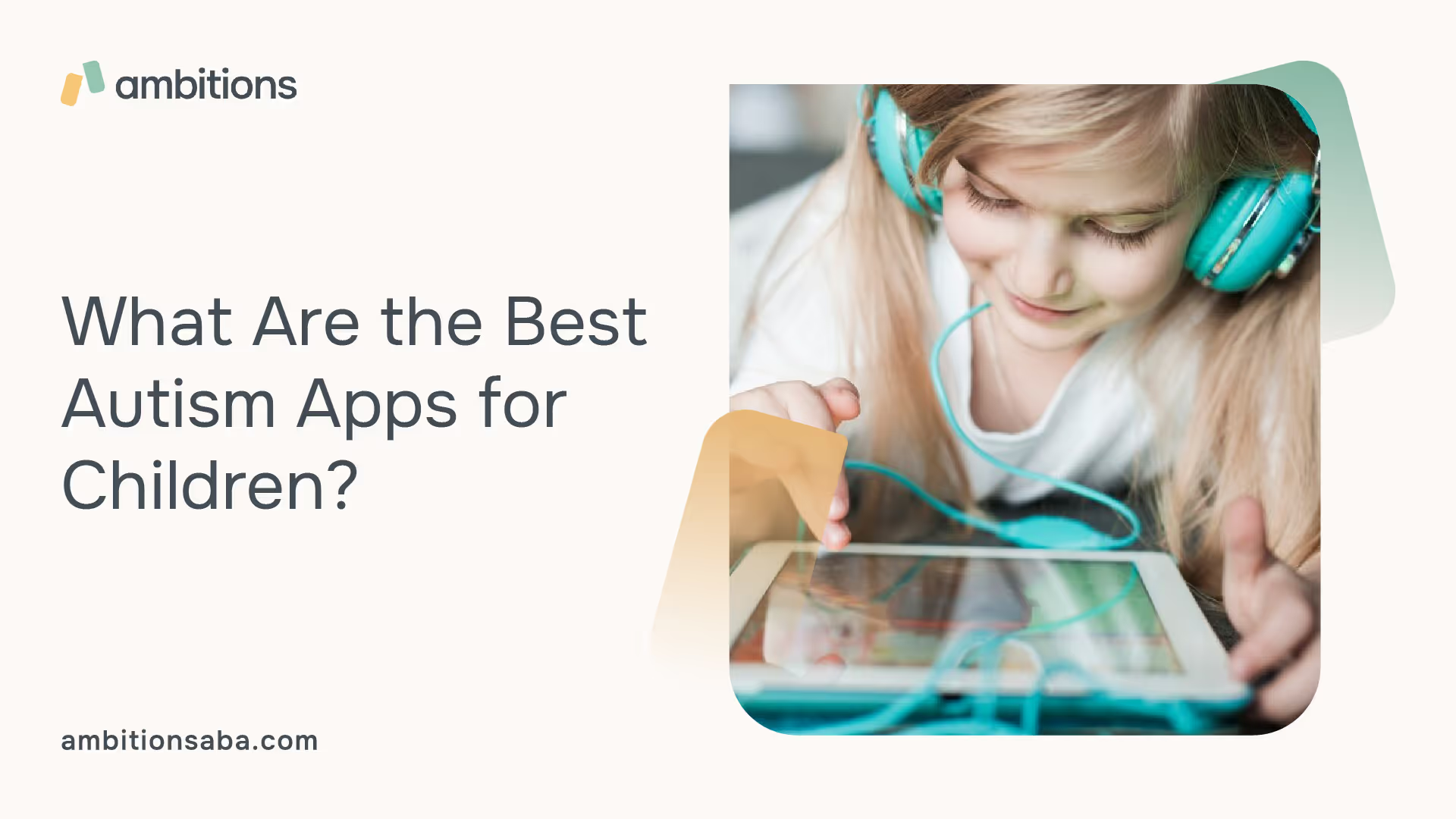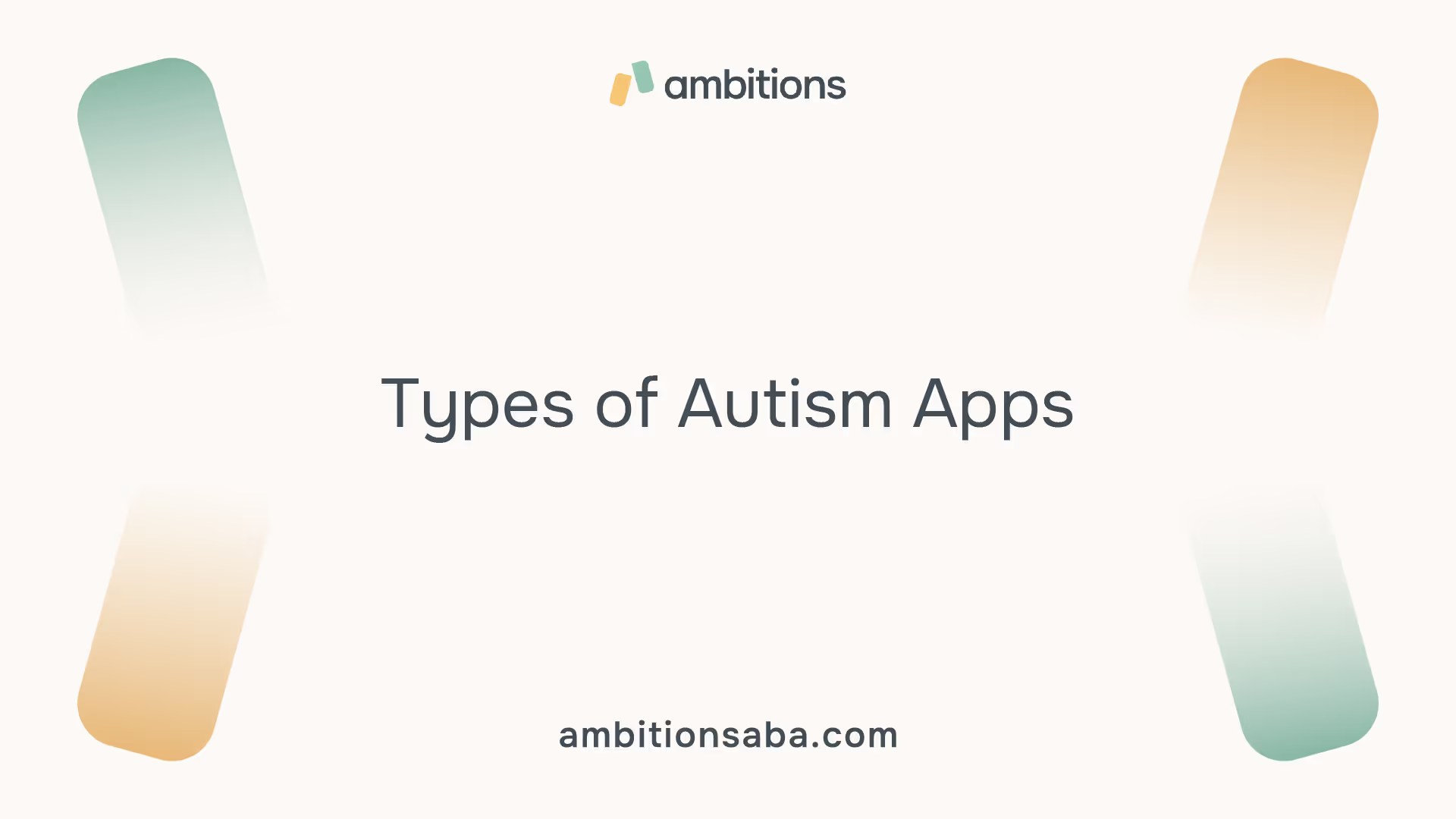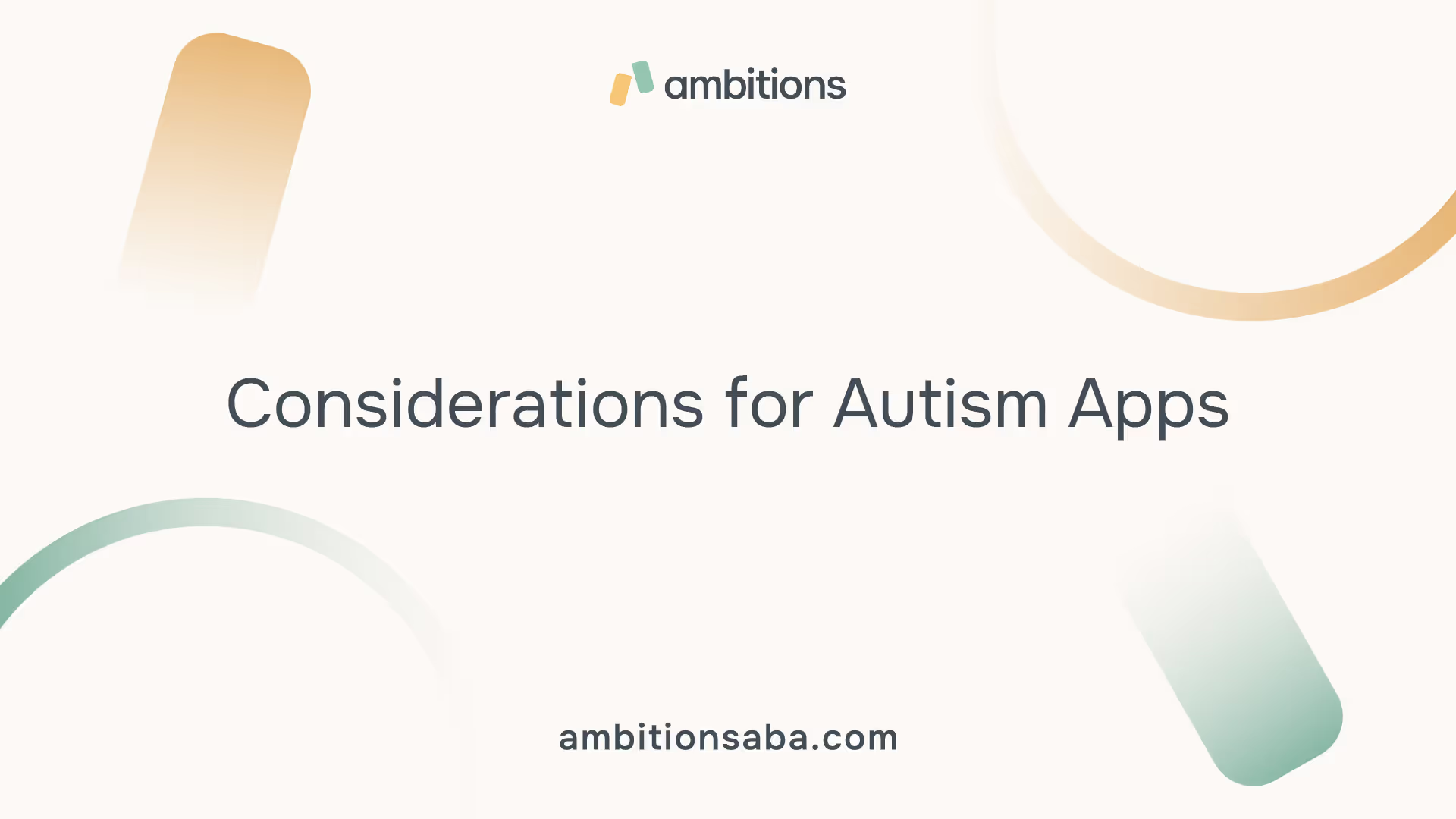Uncovering the Essentials of ABA Therapy

Understanding Autism Apps
Autism apps have become a valuable tool in supporting the development and therapy of children with autism. These applications offer a structured and interactive platform that can be tailored to meet the specific needs of each child. By leveraging the power of technology, autism apps provide a range of benefits for children with autism, enhancing their communication, social skills, cognitive abilities, and more.
Benefits of Using Autism Apps
The use of autism apps as part of therapy and daily life can have significant advantages for children with autism. Here are some key benefits:
- Enhancing Communication: Communication and language skills are vital for children with autism to express themselves and interact with others. Autism apps designed specifically for communication and language development can play a significant role in supporting these crucial areas of development. These apps often provide visual aids, auditory prompts, and interactive exercises to help children improve their verbal and non-verbal communication skills.
- Developing Social Skills: Social skills and emotional regulation are areas where many children with autism can benefit from additional support. Social skills and emotional regulation apps offer a range of features and functions that aim to enhance social communication, emotional recognition, and self-regulation abilities. These apps provide interactive activities, social stories, and visual cues to help children improve their social interactions and emotional understanding.
- Boosting Cognitive Abilities: Cognitive and behavioral apps play a vital role in supporting children with autism by targeting specific areas of cognitive development and behavioral management. These apps offer interactive and engaging activities that promote learning, problem-solving, and self-regulation skills [1]. They can help improve attention, memory, executive functioning, and other cognitive abilities.
- Tailoring to Individual Needs: One of the significant advantages of autism apps is their ability to be tailored to the individual needs of each child. These apps often allow customization based on the child's strengths, challenges, and therapy goals. By personalizing the app experience, children can engage with content that is both meaningful and effective for their unique development [1].
Tailoring Apps to Individual Needs
Every child with autism is unique, and their therapy and support should reflect their individual needs. Autism apps provide flexibility in tailoring the app experience to suit each child's requirements. This customization can include adjusting difficulty levels, selecting specific skills to focus on, and incorporating personal interests and preferences.
When choosing autism apps, it's essential to consider the specific areas of development that your child needs support with. Communication and language apps, social skills and emotional regulation apps, and cognitive and behavioral apps are just a few categories of autism apps available. By identifying the areas where your child may benefit the most, you can select apps that align with their unique needs.
Remember, while autism apps can be beneficial, they should not replace real-world interactions and therapy. It's important to supplement app usage with other forms of therapy and encourage social interactions, play, and communication in various settings. The goal is to integrate autism apps as a supportive tool in a comprehensive approach to therapy and development for children with autism.

Types of Autism Apps
When it comes to supporting children with autism, there are various types of apps available that cater to different aspects of their development. These apps can be a valuable tool in enhancing communication, social skills, and cognitive abilities. Let's explore three main categories of autism apps: communication and language apps, social skills and emotional regulation apps, and cognitive and behavioral apps.
Communication and Language Apps
Communication and language apps designed for children with autism offer features and functions that facilitate communication and language development. These apps provide visual supports, customizable settings, and interactive elements to aid in effective communication and understanding social cues. They aim to enhance communication, foster social interactions, and improve overall language development.
One of the highly recommended communication apps for nonverbal children with autism is Proloquo2Go. It is a customizable app that allows alterations from vocabulary to the appearance of the app itself. Other language therapy apps like Language Therapy for Kids - MITA from ImagiRation have shown promising results in clinical trials, with participants experiencing significant improvements in language scores [2].
Social Skills and Emotional Regulation Apps
Social skills and emotional regulation apps assist children with autism in developing social and emotional competencies. These apps provide interactive scenarios, social stories, visual schedules, and other tools to help individuals understand social situations and manage emotions effectively. By engaging with these apps, children can improve their social interactions and develop important skills for navigating everyday life.
Cognitive and Behavioral Apps
Cognitive and behavioral apps focus on enhancing cognitive abilities and addressing behavioral challenges in children with autism. These apps offer various activities, games, and exercises designed to improve attention, memory, problem-solving skills, and self-regulation. By engaging with these apps, children can benefit from targeted interventions that promote cognitive development and behavioral management.
It's important to note that while these apps can be a valuable resource, they should not replace professional guidance and therapy. They work best when used in conjunction with other interventions and therapy approaches. The selection of the most suitable apps will depend on the specific needs and preferences of the child, as well as input from therapists and educators.
In the next section, we will explore some highly recommended autism apps that have gained popularity for their effectiveness in supporting children with autism.

Considerations for Autism Apps
When selecting autism apps for your child, there are several important considerations to keep in mind. These include cost and insurance coverage, tracking progress and outcomes, and supplementing app usage with real-world interactions.
Cost and Insurance Coverage
Autism apps vary in terms of cost, with some apps being free while others may have a price tag of up to $250. It's essential to consider your budget when choosing an app for your child. However, it's worth noting that some health insurance plans may cover the cost of certain autism apps, especially those that are specifically designed to support communication and language development. Be sure to check with your insurance provider to determine if any coverage is available.
Tracking Progress and Outcomes
Tracking the progress and outcomes of different therapies is crucial for parents of children with autism. Apps that help in tracking goals and outcomes play a vital role in sharing information between parents, teachers, and therapists. This information can be particularly useful when preparing for Individualized Education Plan (IEP) meetings or progress meetings with therapists.
By using apps that facilitate progress tracking, you can monitor your child's development and identify any areas that may require additional support or intervention. This data-driven approach can help inform decision-making and ensure the effectiveness of the therapies being implemented.
Supplementing with Real-world Interactions
While apps can play a significant role in supporting children with autism, it is crucial to remember that no app can replace meaningful connections and engagements with other people. While technology can provide valuable resources and support, it's important to supplement app usage with real-world interactions.
Encourage your child to engage in social activities, interact with peers, and participate in community events. These experiences provide valuable opportunities for practicing and generalizing skills learned through the app. Balancing app usage with real-world interactions helps create a well-rounded learning environment and fosters important social and communication skills.
Remember that every child with autism is unique, and the effectiveness of an app may vary from one individual to another. It's essential to carefully select apps that meet your child's specific needs and preferences. Consult with professionals, such as therapists or educators, to determine which apps align with your child's goals and objectives.
By considering the cost and insurance coverage, tracking progress and outcomes, and supplementing app usage with real-world interactions, you can make informed decisions about the best autism apps for your child's development and well-being.
Recommended Autism Apps
When it comes to supporting children with autism, technology can play a valuable role. There are several autism apps available that can aid in skill development and boost confidence. Here are some highly recommended autism apps for children:
Proloquo2Go
Proloquo2Go is widely regarded as one of the best apps for assisting nonverbal children with autism in communication. This app is completely customizable, allowing for modifications ranging from vocabulary to the appearance of the app itself. With Proloquo2Go, children can use symbols, pictures, and text-to-speech to express their thoughts and needs effectively. The app provides a user-friendly interface and supports language development for individuals on the autism spectrum [2].
Speech Blubs 2
Speech Blubs 2 is a therapist-approved "speech learning" app designed for kids, including those with autism. The app helps children learn first sounds, words, and sentences through engaging and interactive activities. Speech Blubs 2 has received multiple awards, including the Mom’s Choice Award and techozens.com’s “Best and Trusted Speech Therapy App for Kids.” It provides a fun and effective way for children to develop their speech and language skills.
Language Therapy for Kids - MITA
Language Therapy for Kids - MITA, developed by ImagiRation, is the first and only language therapy application supported by clinical data. In a three-year clinical trial involving 6,454 children with autism, those who engaged with MITA showed language score improvements 120% higher than children with similar initial baseline evaluations. This app offers evidence-based language therapy activities to help children with autism reach pivotal developmental milestones. Parents can also track their child's progress through detailed progress reports.
Otsimo
Otsimo offers special education and speech therapy apps designed for children with autism. The apps are based on applied behavior analysis (ABA) and augmentative and alternative communication (AAC) principles. Otsimo aims to help children reach important developmental milestones through fun and engaging activities. Parents can track their child's progress using the app's progress reports, allowing them to monitor growth and identify areas for further support [2].
ABC Autismo
ABC Autismo, available for Android, leverages the TEACCH methodology to help children with autism learn through interactive games. The app is designed to build critical skills and boost confidence in individuals at any level on the autism spectrum. ABC Autismo provides a supportive and engaging environment for children to develop essential skills.
These recommended autism apps offer valuable resources to enhance skill development, communication, and overall progress for children with autism. It's important to remember that apps should be used as part of a comprehensive approach to therapy and should be tailored to each child's individual needs and preferences.
Effectiveness of Mobile Technology
Mobile technology has proven to be an effective medium of intervention for individuals with Autism Spectrum Disorder (ASD). Numerous studies have shown positive outcomes when utilizing autism apps on mobile devices, with 6 out of 10 identified randomized controlled trials (RCTs) indicating significant intervention effects.
Impact on Practical Skills
Mobile technology interventions have demonstrated effectiveness in targeting practical skills that are directly applicable in daily life for individuals with ASD. These interventions can focus on areas such as verbal communication, job coaching, and interview performance. By utilizing autism apps, individuals with ASD can improve their performance in these practical skills, ultimately enhancing their independence and daily functioning.
Fine Motor and Visual Improvements
Studies have shown that mobile technology interventions can significantly improve performance in fine motor and visual areas among individuals with ASD NCBI. Through engaging with interactive activities and games within autism apps, individuals can enhance their fine motor skills, hand-eye coordination, and visual processing abilities. These improvements contribute to overall cognitive and physical development.
Age-Related Benefits
While mobile technology interventions can be beneficial for individuals of all ages, older participants (aged 9 years or above) tend to demonstrate more robust effectiveness of the interventions NCBI. They are more likely to benefit from the targeted interventions compared to younger children under the age of 6 years. As individuals with ASD grow older, their cognitive abilities and understanding of technology increase, allowing them to engage more effectively with mobile devices and utilize the features of autism apps.
In conclusion, mobile technology has shown great potential in supporting individuals with ASD. Autism apps can have a positive impact on practical skills, fine motor development, and visual abilities. It's important to consider the age of the individual when selecting and implementing these interventions, as older participants tend to benefit more from mobile technology interventions. By harnessing the power of mobile technology, parents and caregivers can provide additional support and resources to help individuals with ASD thrive in their daily lives.
Integration of AI in Autism Apps
As technology continues to advance, the integration of artificial intelligence (AI) in autism apps is becoming increasingly prevalent. AI technologies have the potential to revolutionize the effectiveness and functionality of these apps, particularly in enhancing progress tracking, personalizing content delivery, and improving social and emotional skills.
Enhancing Progress Tracking
Integrating AI technologies into autism apps allows for more comprehensive and accurate progress tracking. AI algorithms can analyze data collected from the app, such as user interactions, performance, and engagement levels, to provide valuable insights into a child's development. This data-driven approach enables caregivers and professionals to monitor progress, identify areas of improvement, and make informed decisions regarding interventions and therapies.
By leveraging AI's capabilities, progress tracking becomes more objective and efficient. The algorithms can detect patterns, identify trends, and generate reports that help assess the effectiveness of interventions over time. This information can guide caregivers and professionals in tailoring strategies and interventions to meet the specific needs of each child.
Personalizing Content Delivery
One of the significant advantages of integrating AI in autism apps is the ability to personalize content delivery. AI algorithms can analyze user interactions, preferences, and learning patterns to tailor the content and activities within the app to the individual needs of each child. This personalized approach enhances engagement and promotes more effective learning experiences.
By adapting content to match a child's strengths, interests, and developmental goals, AI-powered apps can provide a more individualized and engaging learning environment. The apps can dynamically adjust the difficulty level of activities, offer customized prompts, and provide real-time feedback to support the child's learning journey.
Improving Social and Emotional Skills
AI technologies can also play a vital role in improving social and emotional skills for children with autism. These apps can incorporate AI-driven features, such as facial recognition and emotion detection, to help children recognize and understand emotions in themselves and others. By analyzing facial expressions and body language, the apps can provide real-time feedback and guidance to assist children in navigating social interactions.
Additionally, AI-powered apps can simulate social scenarios and provide virtual practice environments where children can develop and refine their social skills. These simulations can be adjusted based on the child's abilities and gradually expose them to different social situations, fostering confidence and competence in social interactions.
The integration of AI in autism apps shows great promise in enhancing progress tracking, personalizing content delivery, and improving social and emotional skills. By leveraging the power of AI, these apps have the potential to revolutionize the way children with autism learn, communicate, and interact with the world around them. However, it's important to note that AI should complement, not replace, human intervention and support. The role of caregivers, professionals, and real-world interactions remains crucial in promoting the holistic development of children with autism.
References
[1]: https://www.adinaaba.com/post/autism-apps-for-children
[2]: https://carmenbpingree.com/blog/9-best-autism-apps-for-skill-development-and-confidence/

